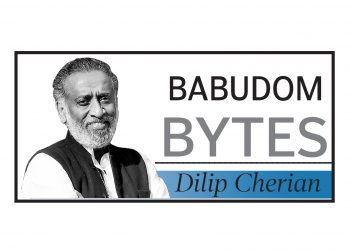The suspended Director of the International Institute for Population Sciences (IIPS), KS James is the most highly rated demographer in the country and among the leading ones in the world. So, naturally, his suspension has become the talk of Delhi’s babu corridors.
The official reason cited for the suspension of James was his alleged involvement in unauthorised research activities and financial irregularities at the IIPS. But those in the know say that James was already facing fire for ‘unflattering’ data. Under James, the institute, which is an organisation of the Ministry of Health and Family Welfare, conducts the National Family Health Surveys (NFHSs) and other sensitive topics such as the impact of government policies on population dynamics, public health and socio-economic inequalities.
The NFHS-5 survey, the cause of James’ ouster, showed that anaemia had risen, and open defecation was still prevalent in all states despite the Swachh Bharat boasting.
The survey also showed that more than 40% of households did not have access to clean cooking fuel – thus questioning the claims of success of the Ujjwala Yojana. It said in rural areas, more than half the population, 57%, do not have access to LPG or natural gas. Clearly, none of these findings will bring cheer to the Centre, as they bring to light certain inconvenient truths. The discomfort within the sarkar can be gauged from the fact that some recent reports say that it was mulling to drop the anaemia measurement for NFHS-6.
James’ suspension is being viewed by many as a message to those who may wish to challenge official narratives: rebel at your own risk. Point taken?
Importance of being SK Mishra
The Modi sarkar has gone to unprecedented lengths to retain Sanjay Kumar Mishra as the Director of the Enforcement Directorate (ED). The government moved a special application in the Supreme Court citing ‘extraordinary and unusual’ circumstances to allow his continuation in the post. Although few observers buy the excuse that Mishra’s continuation is needed for the ongoing Financial Action Task Force (FATF) review, the apex court obliged and extended Mishra’s tenure till September 15, citing ‘public and national interest’ even though earlier it had noted that the previous extension of tenure was ‘illegal’. Clearly, Mishra is a special case, according to the government.
The thing is that under Mishra’s tight control, the ED has acquired more powers and its investigations of Opposition leaders and critics of the government have led to allegations of ‘indiscriminate use’ of the agency by the government against its detractors, even if the conviction rate in money laundering cases probed by ED remains dismal.
But what perhaps makes Mishra the ‘ideal’ babu in the eyes of the ruling party is that he maintains a low profile while making himself indispensable to those in power. Observers noted this trait in the officer even during the UPA days when he was reportedly close to the late Congress leader Ahmed Patel and Pranab Mukherjee. Apparently, during Pranab’s tenure as Finance Minister, Mishra was more powerful than even the then Revenue Secretary. Since then, he’s come a long way and the ED has never been the same.
Strategic move or political manoeuvre?
The recent appointment of former Karnataka DGP Rupak Kumar Dutta as security advisor to West Bengal Chief Minister Mamta Banerjee has stirred much interest and debate. His illustrious career as an IPS officer, having served in different capacities, including as Special Director of the Central Bureau of Investigation (CBI), adds intrigue surrounding his new role in the state.
Sources have informed DKB, that Dutta’s impressive credentials apart, the appointment assumes even greater significance given the recent security breach near Chief Minister Mamta Banerjee’s residence. The arrest of an individual carrying weapons and narcotics, and possessing fake identity cards of multiple security agencies, has heightened concerns about the state of security preparedness in West Bengal.
Some critics, however, view Dutta’s appointment with scepticism. His sudden transfer to the Ministry of Home Affairs as Special Secretary, just before the selection of the CBI director, followed by his return to his home state of Karnataka to assume the role of state DGP, they say, point to a likely political motivation behind the decision. Although Dutta had been offering advisory services to the West Bengal government even before the panchayat polls, his formal appointment comes at a critical juncture. It is hoped that given his extensive background in the CBI, Dutta will bring a unique perspective that enables the state government to tackle security-related issues effectively.
Share a babu experience! Follow dilipthecherian@twitter.com. Let’s multiply the effect
